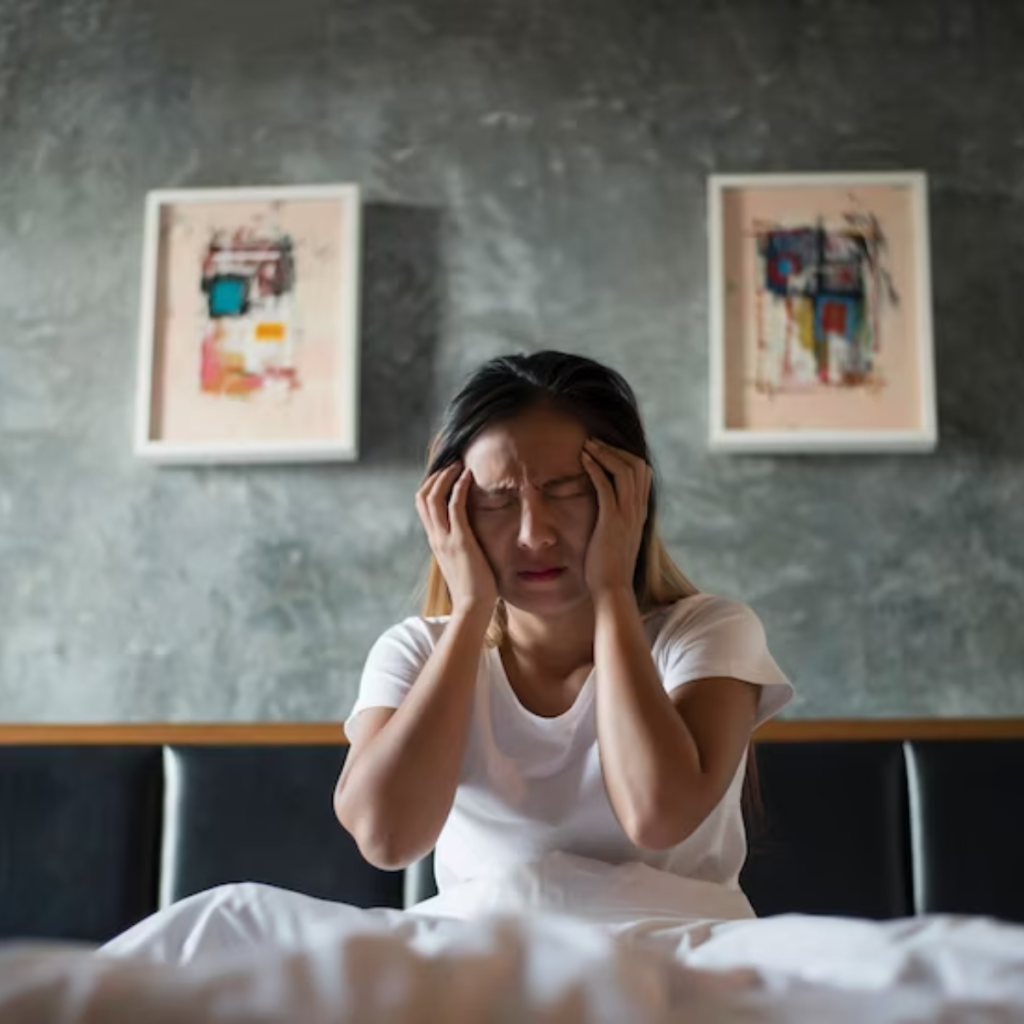Learn about the various factors that contribute to postpartum back pain and gain a deeper understanding of how to alleviate and prevent this common discomfort.
Understanding the Factors Contributing to Postpartum Back Pain
Ah, the joys of motherhood! Along with the beautiful moments and precious cuddles, many new moms also face the challenge of postpartum back pain. But fear not, dear reader! We are here to unravel the tangled web of factors that contribute to this pesky discomfort. So, grab your baby sling and let’s dive into the anatomy, hormones, psychological factors, lifestyle choices, and medical conditions that can all play a part in postpartum back pain.

The Anatomy of Postpartum Back Pain
As we embark on this enlightening journey, it’s important to understand the inner workings of our bodies. Hormones, my friends, are the magical messengers that control many aspects of our lives, including post-pregnancy back pain.
During pregnancy, our bodies release a hormone called relaxin, which helps loosen ligaments in the pelvic area to accommodate the growing baby. However, this hormone doesn’t discriminate – it affects other joints and ligaments too, leading to instability and potential back pain.
But let’s dive deeper into the role of hormones in postpartum back pain. Once the precious bundle of joy arrives into the world, our bodies undergo yet another hormonal rollercoaster. Hormone levels fluctuate as our bodies adjust to the postpartum period, and these fluctuations can have a direct impact on our back health.
As hormone levels fluctuate, certain muscles may become weaker or imbalanced, putting strain on the back. It’s like a teeter-totter, but with hormones instead of children. The delicate balance of hormones during this time can contribute to the development or exacerbation of postpartum back pain.
The Impact of Physical Changes During Pregnancy
Pregnancy is truly a transformative experience, both emotionally and physically. Our bodies accommodate the growing baby by shifting their center of gravity, which can change our posture. This shift, combined with weakened abdominal muscles and the strain of carrying a little one, can all contribute to that pesky postpartum back pain.
As the baby grows, the center of gravity shifts forward, causing the spine to curve and the lower back to arch more than usual. This change in posture can put additional stress on the muscles and ligaments of the back, leading to discomfort and pain.
Furthermore, weakened abdominal muscles play a significant role in postpartum back pain. During pregnancy, the abdominal muscles stretch and separate to make room for the growing baby. After giving birth, it takes time for these muscles to regain their strength and stability. As a result, the back muscles have to compensate for the lack of support from the abdominal muscles, leading to increased strain and potential pain.
Carrying a little one is undoubtedly a beautiful experience, but it can also take a toll on our bodies. The weight of the baby, combined with the physical demands of daily activities, can put immense pressure on the back. From lifting the baby to bending over to change diapers, these repetitive movements can strain the muscles and ligaments, contributing to postpartum back pain.
So, as we navigate the journey of postpartum back pain, it’s crucial to understand the intricate interplay between hormones and physical changes. By gaining a deeper understanding of the anatomy behind postpartum back pain, we can take proactive steps to alleviate discomfort and promote a healthy recovery.
The Psychological Factors of Postpartum Back Pain
As a new mom, it’s normal to feel a whirlwind of emotions – from overwhelming love to sleep-deprived zombie mode. But did you know that these psychological factors can also influence your back pain? It’s true!
Let’s dive deeper into the fascinating world of postpartum back pain and explore the psychological factors that contribute to this discomfort.
Stress and Anxiety’s Impact on Back Pain
When we’re stressed or anxious, our bodies react in both obvious and subtle ways. These emotional pressures can lead to muscle tension and even muscle spasms, which can exacerbate postpartum back pain. The constant worry and pressure of being a new mom can take a toll on your physical well-being.
Imagine this scenario: You’re juggling a crying baby, trying to soothe them while also managing household chores and possibly even work. The stress builds up, and your back starts to ache. It’s not just a coincidence; it’s the direct result of the psychological strain you’re experiencing.
So, take a deep breath, mama, and let the stress melt away like butter on a hot pancake. Find healthy ways to manage your stress, such as practicing mindfulness, engaging in relaxation techniques, or seeking support from loved ones. By addressing the psychological factors contributing to your back pain, you can find relief and regain your physical and emotional well-being.

The Connection Between Sleep Deprivation and Back Pain
As every new parent knows, sleep becomes somewhat of a mythical creature during those first few months. This lack of sleep not only leaves us feeling like we’ve joined a secret society of zombies, but it can also worsen our back pain.
When we’re tired, our posture may suffer, putting additional strain on our already achy backs. Picture yourself sitting on the couch, trying to breastfeed your little one in the middle of the night. Your exhaustion makes it challenging to maintain proper posture, and you find yourself slouching, putting unnecessary pressure on your back.
Furthermore, sleep deprivation affects our body’s ability to heal and recover. Adequate sleep is crucial for tissue repair and reducing inflammation, both of which play a significant role in relieving back pain. So, it’s essential to prioritize rest and find ways to improve your sleep quality as a new mom.
Consider implementing a bedtime routine, creating a sleep-friendly environment, and seeking help from your partner or support network to share nighttime responsibilities. By addressing sleep deprivation, you can not only improve your overall well-being but also alleviate postpartum back pain.
Lifestyle Factors Contributing to Postpartum Back Pain
Now, let’s shift gears for a moment and explore the lifestyle factors that can influence postpartum back pain. From diet and exercise to posture and baby care, our everyday choices can have a significant impact.
The Influence of Diet and Exercise
You are what you eat, they say, and when it comes to postpartum back pain, it’s no different. A healthy diet rich in nutrients can support overall musculoskeletal health. Consuming foods that are high in calcium, such as dairy products and leafy greens, can promote bone strength and reduce the risk of back pain. Additionally, incorporating foods that have anti-inflammatory properties, like fatty fish and berries, can help alleviate any inflammation that may contribute to discomfort.
Exercise also plays a crucial role in preventing and managing postpartum back pain. Strengthening your core muscles, in particular, can provide much-needed support to your back. Engaging in exercises that target the abdominal and back muscles, such as pelvic tilts and gentle back extensions, can help improve stability and reduce strain on the spine. Just remember, you don’t have to run a marathon – even gentle exercises like yoga or taking walks with your little one can work wonders.
The Effect of Posture and Baby Care
When you have a precious baby in your arms, it’s easy to get carried away – literally! From nursing to diaper changes, our posture can take a hit. However, maintaining good posture is essential in preventing postpartum back pain.
During breastfeeding, ensure that you are sitting in a supportive chair with proper backrest. Use pillows to prop up your baby, bringing them closer to your breast, rather than hunching over towards them. This will help maintain a neutral spine position and reduce strain on your back.
When it comes to diaper changes, consider using a changing table that is at a comfortable height. This will allow you to maintain good posture while attending to your baby’s needs. If a changing table is not available, use a sturdy surface that is at a suitable height to avoid excessive bending or twisting.
Another important aspect of baby care is lifting and carrying your little one. It’s crucial to use proper body mechanics to avoid straining your back. When lifting your baby, bend at your knees and keep your back straight. Engage your leg muscles to lift the weight, rather than relying solely on your back. Consider using a baby carrier to distribute the weight evenly, saving your back from unnecessary strain.
In conclusion, lifestyle factors such as diet, exercise, posture, and baby care can significantly contribute to postpartum back pain. By making conscious choices and incorporating healthy habits into your daily routine, you can reduce the risk of developing or exacerbating back pain, allowing you to fully enjoy the precious moments with your little one.
Medical Conditions That Can Cause Postpartum Back Pain
While many cases of postpartum back pain are related to the joyous journey of motherhood itself, some medical conditions can also rear their unwelcome heads. Let’s explore two of the most common culprits: postpartum sciatica and the infamous epidural.
Understanding Postpartum Science
Sciatica, the pesky pain caused by compression or irritation of the sciatic nerve, can make its unwelcome entrance during the postpartum period. As your ligaments and joints recover from pregnancy, the sciatic nerve can become pinched or inflamed, leading to shooting pain down the leg. Ouch!
The Link Between Epidural and Back Pain
Ah, the miraculous epidural – the mother’s relief and the anesthesiologist’s masterpiece. While epidurals provide much-needed pain relief during labor and delivery, they can also contribute to postpartum back pain. The needle used during the procedure can cause temporary soreness at the injection site, and the altered sensations from the epidural may affect your posture and movement patterns.
Prevention and Management of Postpartum Back Pain
Now that we’ve dissected the factors that contribute to postpartum back pain, let’s focus on prevention and management strategies. After all, we want every mom to enjoy the boundless joys of motherhood without the constant nagging of back pain.
Importance of Physical Therapy in Postpartum Recovery
Physical therapy can be an invaluable ally in your postpartum journey. A skilled therapist can assess your posture, strength, and movement patterns to develop a tailored exercise program that targets your specific needs. They can also provide manual therapy techniques to ease discomfort and educate you on proper body mechanics for day-to-day activities.
The Role of Medication in Managing Postpartum Back Pain
While we always recommend holistic approaches first, sometimes medication can provide much-needed relief for severe cases of postpartum back pain. Over-the-counter pain relievers and muscle relaxants may help alleviate discomfort, but always consult with your healthcare provider before starting any new medications, especially if you’re breastfeeding.
And there you have it, folks – our comprehensive guide to understanding the factors contributing to postpartum back pain. Remember, every mom’s journey is unique, so don’t hesitate to reach out to healthcare professionals for personalized guidance. Now go forth, supermoms, and conquer the world with your newfound knowledge and backs that are pain-free!



